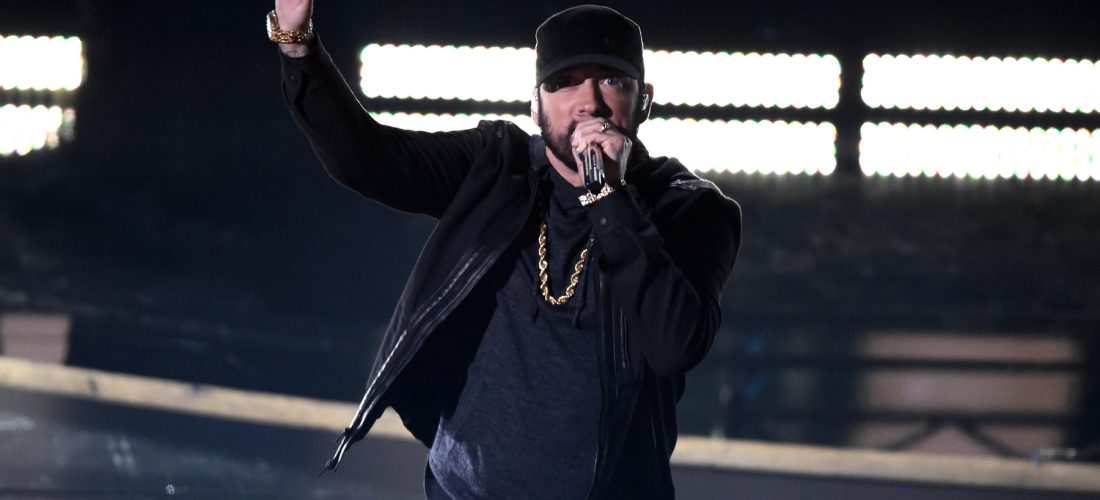Eminem Can’t Quite Update His Shock Jock Game, Again, on ‘Music to Be Murdered By: Side B’
In the music video for “Gnat,” off Eminem’s latest album Music to Be Murdered By: Side B, a beard-sporting Marshall Mathers is admitted to a treatment facility for what we’re led to believe is coronavirus. “They say these bars are like Covid,” Em raps. “You get ‘em right off the bat.” It’s a reference to widely debunked theories about the source of the Covid-19 virus, the sort of thing you might read on Facebook. At another point in the video, Eminem dramatically removes his face mask in order to breathe onto the camera — a disturbing visual even without the pandemic’s more ambient anxieties. “I’m sick and I’m not gonna cover my mouth next time that I cough,” he stammers before launching into the chorus. Later on, Em muses on the efficacy of Hydroxychloroquine, the now-discredited drug popularized by Trump in the early days of the pandemic. It’s all familiar, if more exhausted, referentialism, the sort of thing that made Eminem’s run as America’s de-facto shock jock at the beginning of the 2000s so prolific.
Back then, poking fun at current events and celebrities in a rap song was the height of political agitation. Nowadays things are different, and Eminem has spent the past few years trying to figure out where his voice fits into a more serious political moment. With 2017’s Revival, the 48-year-old MC attempted to propose himself as the one celebrity capable of bridging our nation’s deep racial divisions. Our white rapper-in-chief. (“In a country that claims that its foundation was based on United States ideals/ That had its Natives killed/ Got you singin’ this star-spangled spiel/ To a piece of cloth that represents the ‘Land of the Free’ that made people slaves to build,” he offered on “Untouchable.”) As a result, Em’s music, which has always suffered from a certain stubborn self consciousness, felt increasingly strained and bloated, especially for a rapper whose real calling card has always been his skill at treating intricate syllable patterns like Tetris pieces. His genius is formal, not topical.
Music to Be Murdered By: Side B, a surprise follow-up to January’s Music to Be Murdered By, is hardly devoid of the technical prowess that continues to make Eminem interesting to listen to. On the tail end of “Gnat,” Em launches into a time signature trapeze act, weaving lines together with genuinely fun dexterity. But where Eminem’s raw talent is occasionally present, it’s muddied by a fixation on what feels like a conflation of personal and political grievances. Music critics, ungrateful fans, lying women, Trump, coronavirus, police brutality, and gun violence are all equally frustrating to Eminem, giving the album the same feeling as long-winded political ramblings from distant relatives. Our white rapper-in-chief, indeed.
It’s hard to understand why exactly we need a side B of Music to Be Murdered By in the first place. The original, which arrived at the top of our year of discontent, was Eminem’s follow up to Revival and found him leaning into a confoundingly defensive position. Listening to the album, you’d swear he wasn’t one of the bestselling rappers of all time. That he didn’t have an Academy Award and a widely acknowledged impact on the shape and tenor of modern hip-hop. Yet for all of Em’s gripes with the current rap game on the record, it opened at Number One on the Billboard Hot 100, which might explain the decision to tack on 16 extra songs and call it a deluxe album.
With Side B, it’s more of the same. On “Favorite Bitch” Em enlists the perennial R&B collaborator Ty Dolla Sign to construct an overwrought metaphor comparing music to women. “It’ll never be the same / As the era whence we came / From Nas to Pac, Rak’, Eric B. and Kane,” he raps after asking the song’s muse if she’d marry him again. On “These Demons,” Em’s frustrations are focused more clearly on listeners. “I want the new, but old Shady,” he raps, before adding “man they just keep moving the goalpost, don’t they?” For a song lamenting the fickleness of fans, it certainly takes pains to appease them. The track features the Dallas rapper MAJ doing a serviceable Travis Scott impression and manages to cram a poorly thought out Mariah Carey diss, a reference to Colin Kaepernick, the death of George Floyd, cancel-culture, and the current recession into one verse.
On a song literally titled “Tone Deaf,” Eminem finds himself in what feels like a South Park rendition of Hamilton, delivering lines like: “I see the rap game, then attack the verses / Turn into a graveyard packed with hearses,” before an extended aside about a tryst with a middle aged woman. More confounding, though, is how appealing Eminem is when he’s not complaining or trying to get a shock reaction. On “Killer,” an infectious romp that could very well be a Tyga B-side, his penchant for rhyme schemes that clasp like belt buckles make for a patently enjoyable listen. His winding and elastic cadence is all the more potent when it isn’t being used in service of political observations too on the nose for SNL.
And yet, like Lorne Michaels’s weekly series, Eminem is burdened with what seems like a responsibility to respond to the news. When President-elect Joe Biden licensed Eminem’s hit “Lose Yourself” for his campaign’s final ad, the rapper may well have finally been consumed by the political establishment. These days, his diatribes fit safely within the margins of mainstream agitation, no matter how much he’d like us to believe he’s still pushing the envelope.
